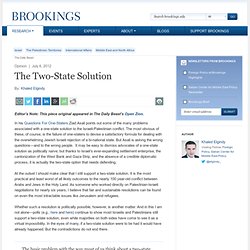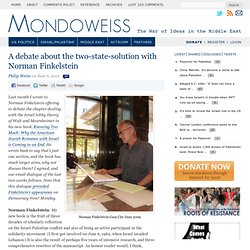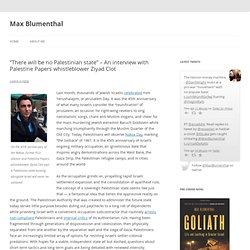

The Two-State Solution in the Israeli-Palestinian Conflict. Editor's Note: This piece original appeared in The Daily Beast's Open Zion.

In his Questions For One-Staters Ziad Asali points out some of the many problems associated with a one-state solution to the Israeli-Palestinian conflict. The most obvious of these, of course, is the failure of one-staters to devise a satisfactory formula for dealing with the overwhelming Jewish Israeli rejection of a bi-national state. But Asali is asking the wrong questions—and to the wrong people. It may be easy to dismiss advocates of a one-state solution as politically naïve; but thanks to Israel’s ever-expanding settlement enterprise, the cantonization of the West Bank and Gaza Strip, and the absence of a credible diplomatic process, it is actually the two-state option that needs defending. At the outset I should make clear that I still support a two-state solution. Whether such a resolution is politically possible, however, is another matter. A debate about the two-state-solution with Norman Finkelstein. Norman Finkelstein Gaza City June 2009 Last month I wrote to Norman Finkelstein offering to debate the chapter dealing with the Israel lobby theory of Walt and Mearsheimer in his new book, Knowing Too Much: Why the American Jewish Romance with Israel is Coming to an End.

He wrote back to say that’s just one section, and the book has much larger aims, why not discuss them? I agreed, and our email dialogue of the last two weeks follows. Note that this dialogue preceded Finkelstein’s appearance on Democracy Now! Monday. Norman Finkelstein: My new book is the fruit of three decades of scholarly reflection on the Israel-Palestine conflict and also of being an active participant in the solidarity movement. We are now at a crossroads in the conflict. Weiss: Here is where we differ. “There will be no Palestinian state” – An interview with Palestine Papers whistleblower Ziyad Clot.
On the 45th anniversary of the Naksa, former PLO advisor and Palestine Papers whistleblower Ziyad Clot says a Palestinian state existing alongside Israel will never be achieved Last month, thousands of Jewish Israelis celebrated Yom Yerushalayim, or Jerusalem Day.

It was the 45th anniversary of what many Israelis consider the “reunification” of Jerusalem, an occasion for right-wing revelers to sing nationalistic songs, chant anti-Muslim slogans, and cheer for the mass murdering Jewish extremist Baruch Goldstein while marching triumphantly through the Muslim Quarter of the Old City. Today, Palestinians will observe Naksa Day, marking “the Setback” of 1967. Ditching the status quo in Palestine. It has been a bad week at the office for the Palestinian Authority (PA) leadership.

Last weekend, protests on successive days against the proposed meeting between President Mahmoud Abbas and Kadima Party head Shaul Mofaz were met with violent attacks by PA forces. The harassment and baton swings (including the targeting of the media) provoked yet another demonstration on Tuesday, where there were chants against Oslo, the PA, and the repression of dissent. Groups like Amnesty International have also spoken out. By coincidence, two other stories were reported at the same time: first, the detention of around 200 people in recent weeks by the PA, particularly in the northern West Bank; and second, the request by Israel on behalf of Salam Fayyad for an IMF loan to help prevent a PA financial collapse. This is shaping up to be a time of clarity, and the issues go much deeper than heavy-handed EU-trained police. Rather than using the question of "if not this, then what?
" The “End of the Two-State Solution” Spells Apartheid and Ethnic Cleansing, not Binationalism and Peace. Declaring the death of the two-state solution in the Israeli-Palestinian conflict has become increasingly fashionable among growing sections of both right and left-wing streams of Palestinians and Israelis.

The late Palestinian intellectual Edward Said was one of the first to propagate this notion in his essays on the failure of the Oslo accords and on bi-nationalism. Since then, and in the wake of a second Palestinian uprising, a unilateral Israeli redeployment from the Gaza Strip, a vicious one-sided Israeli war on the same territory, and a comatose negotiations process, it is little wonder exasperated observers and participants are increasingly declaring the two-state solution dead, while kindling the search for alternatives.
Rachel Shabi follows this trend in a recent Guardian commentary: We could argue over who killed it, but what's the point?